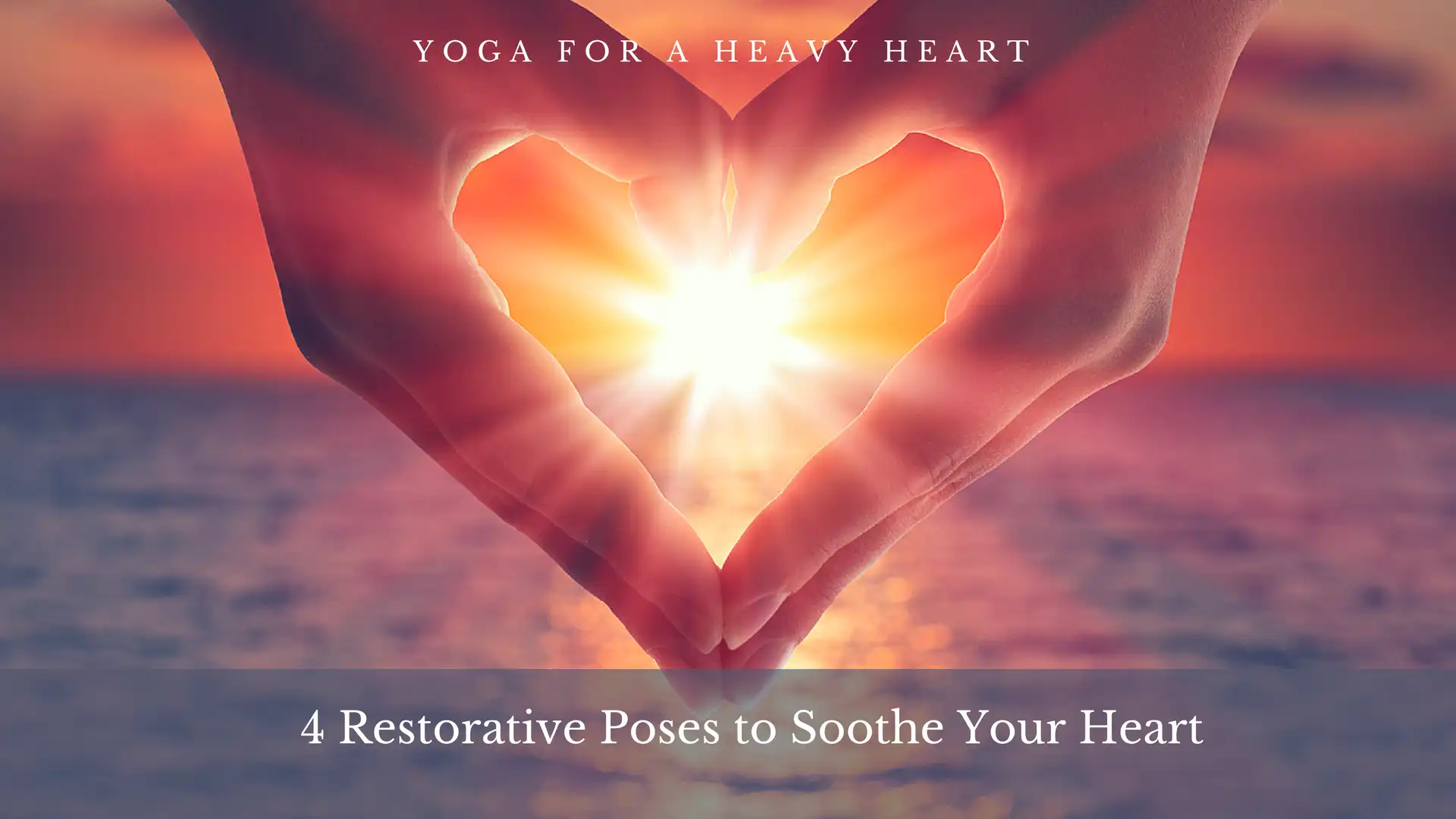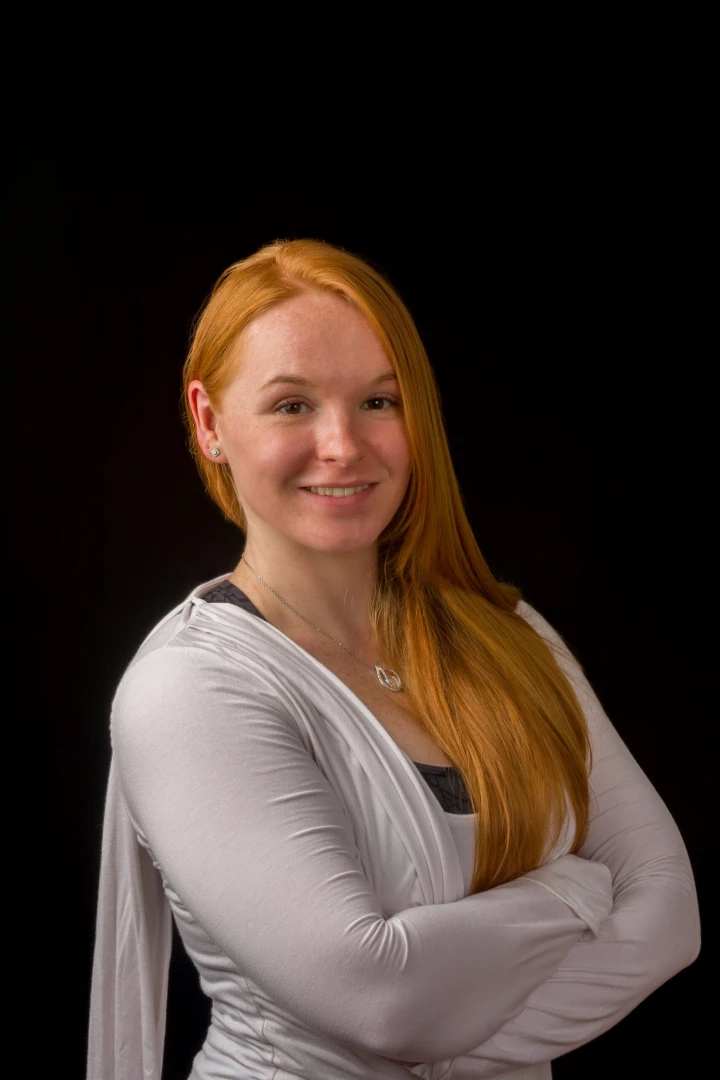Yoga for a Heavy Heart: 4 Restorative Poses to Soothe Your Heart

Is your heart in need of some restorative yoga? Every heart needs to heal at one point or another throughout the course of a lifetime. Our heart is what helps us to be compassionate, teaches us how to trust and transforms us into positive, loving beings.
But sometimes that big, open heart becomes vulnerable and breaks—whether it is from the loss of a loved one to a breakup to a catastrophic loss of life from a senseless act of violence. Gone untreated, our hearts can become more cynical and we lose a little piece of ourselves. Maybe the metaphorical heart never fits back together like it used to but it certainly heals and grows stronger with each challenge it faces.
How Restorative Yoga can Open Your Grieving Heart
In yoga, we often talk about the heart, our center of compassion, and use teaching language that encourages our hearts to open such as lifting and spreading the heart up towards the ceiling in Ustrasana (Camel Pose). An alternate name we give to backbends is heart openers. These can feel really great for the unbroken heart. However, to cope and sit with the feelings of a broken heart, backbends can be overwhelming and intense, sending some students into emotional turmoil like crying for days.
When my heart is heavy with grief, I turn to this Restorative Yoga sequence to quiet my thoughts, to slow life down and to feel what’s happening in my heart in order to heal. It’s my belief that when I think of the pain that I’m experiencing and the thought of doing Restorative Yoga, my head would say, “You have to be crazy to stay still, let’s get busy. Find some classes to teach, write some articles, watch television until you’re numb.” Then my higher reasoning kicks in and says, “Yes, Restorative Yoga sounds absolutely splendid and soothing. Let’s try that and see what we discover.” Being alone in stillness can be so scary, really terrifying, but there is a sense of peace when you own those feelings and watch them in your body. The experience can end up being rather empowering and peaceful.
With this being said, I turn my attention to grounding the heart for healing rather than exposing it in a deep active backbend. I use this four-pose Restorative Yoga sequence that helps to support the heart, release the back of the heart from tension and then I empower myself to make the decision to either continue grounding the heart until I’m ready, or open the heart up with a soft backbend. The ending of this yoga sequence is where I find a lot of answers because I have the choice to protect the heart more because it still needs time to heal in the process or I’ve come a bit farther in releasing the pain and ready to open my heart back up to the world.
How to Do Child’s Pose 
Start where the heart is. When the heart feels like it’s shattered into a million little pieces, you feel lost and ungrounded, Balasana (Child’s Pose) is where you go to start the healing process. When we are feeling down, our body language mimics this; we round the shoulders forward and the upper back to protect the front of the heart. Child’s Pose does the same action.
- On all fours, place your big toes together and slide your knees apart to about as wide as your mat.
- Sit your hips back over your heels (if they don’t reach place support between your hips and heels) and place a bolster or stack of long folded blankets vertically along the mat.
- Rest your torso onto the props. The props should support you from your hips to your head.
- Wrap your arms around the bolster to give yourself a much needed hug turn your head to one side.
- Unless you find a lot of discomfort, stay here 5 to 10 minutes.
Why this Yoga Pose?
With a supported Child’s Pose, you rest your heart on a sturdy bolster or a few stiff blankets so that you can feel that your heart is safe; it feels grounded.
How to Do Belly-Facing Savasana
- From your Child’s Pose, release your legs slowly out and behind you until they are fully extend. The pelvis hangs down from bolster and releases down towards the mat or floor. The torso is completely supported by the props and the heart soothes itself into the bolster.
- Place your hands at the very top of the bolster, one hand stacked onto of the other and support your forehead on top of the hands.
- Breathe evenly and slowly. Stay here 10 to 15 minutes unless you need to come out sooner.
Why this Yoga Pose?
The heart continues to feel supported while allowing your body to blossom out from the inward-folding position of Child’s Pose.
How to Do Supported Reclined Twist 
- From Belly Facing Savasana (Corpse Pose), bend the knees, draw the hands back and press your torso away from the bolster. Snuggle your right hip up against the end of the bolster as you frame the bolster with your hands. Inhale lift and lengthen your torso, giving your heart a peek of what it’s like without support (notice these few seconds- they can be transformational) exhale, turn the torso, and rest it on the bolster.
- Walk the arms out in front and hug your bolster. Keep the head looking to the left.
- Remain here for 5 to 10 minutes. Then repeat to the left side for an even amount of time.
Why this Yoga Pose?
The twisting action releases the spine, especially the back of the heart, in between the shoulder blades. The twist also alleviates any pent up tension brewing in the belly and lower back. The heart is still protected since the chest is facing the floor but half of the heart is revealed while the other half is supported by the bolster.
How to Choose Your Yoga Sequence 
At this point in the practice, I’ve had a lot of time to be present with my feelings in the body without attaching to them. I’ve felt support under my heart and I’ve also felt half the heart without support. On certain days, my heart still may not be restored and ready to lift and in that case, I return to Belly-Facing Savasana.
On other days with the same practice, my heart feels ready to expand, knowing that the back of my heart will be fully supported. In this case, I choose Supta Baddha Konasana (Supine Bound Angle Pose). I use this choice to understand where I am in the healing process. Sometimes we forget that healing is a process; we are sick or hurt one day and then all of a sudden all is well and healed. The healing process acts more like an ebb-and-flow process where some days the heart is in so much pain it needs the extra support and time to ground, and other days where the heart feels the yearning to be open and welcoming, compassionate and free.
- Picking up from the Reclined Spinal Twist, unwind the back of the hips to line up with the bottom edge of the bolster and rest the spine down along the bolster vertically. You can use blocks to slant the bolster if you like.
- Put the soles of the feet together and open the knees out to the sides of the mat. Place additional blankets or blocks under the outer thighs and knees if your knees or inner thighs are uncomfortable.
- Support the head with a folded blanket on top of the bolster and under the neck. Place an eye pillow or rolled-up handcloth over the eyes.
- Bring your hands either onto your belly or out to the sides. I often drape a blanket over myself if I feel like the heart is too exposed.
- Stay here for 5 to 20 minutes, building up time for your heart to heal, grow and radiate outward.
Every heart heals on its own time frame. Some days you will need restorative yoga and the support of props and other days the support of friends, family and community. Being in touch with how you feel and giving yourself the space to grieve your heartache opens up a new path to find answers and feel complete despite the hole in your heart.
Another article from Allison Schleck – 5 Chair Poses for Prenatal Yoga.
Study with YogaUOnline and Judith Hanson Lasater: Nourish and Rejuvenate – The Art of Practicing and Teaching Restorative Yoga.
 Allison Schleck, E-RYT 500, RPYT is a vinyasa based yoga teacher, fascinated by the intricate relationship between the mind and body. She offers a range of alignment-focused classes touching on anatomy, philosophy and creative propping with a mindful approach. In addition to teaching group classes and managing the Yoga Culture studio in Danbury, CT, she also teaches at Open Door Family Medical Center in Westchester, NY empowering mother’s to be with prenatal yoga classes and childbirth education. You can find her @allisonschleck on instagram and www.allisonyoganidra.com.
Allison Schleck, E-RYT 500, RPYT is a vinyasa based yoga teacher, fascinated by the intricate relationship between the mind and body. She offers a range of alignment-focused classes touching on anatomy, philosophy and creative propping with a mindful approach. In addition to teaching group classes and managing the Yoga Culture studio in Danbury, CT, she also teaches at Open Door Family Medical Center in Westchester, NY empowering mother’s to be with prenatal yoga classes and childbirth education. You can find her @allisonschleck on instagram and www.allisonyoganidra.com.



